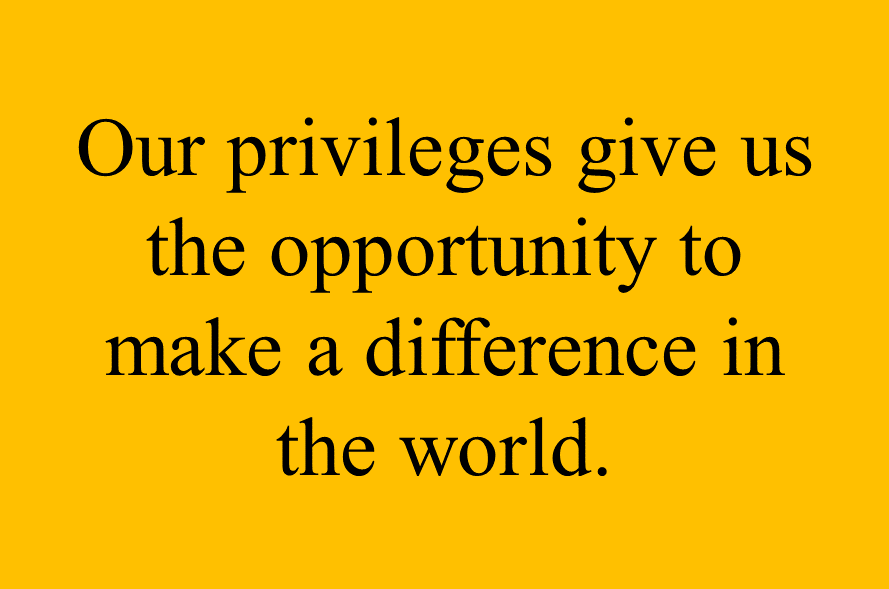
What does it mean to use our privileges to support change?
As a Happy New Year message (on facebook), I wrote:
May we use our privileges to create more sanity, equity, joy and peace in the world this year.
There seemed to be a lot of resonance with that message.
I wrote the message that way because it didn’t feel right to just wish people joy as if I hope they get that through luck or kindness from the universe. I don’t think it works that way.
Instead, I wanted to convey that it’s up to us. WE have to make the changes that we want. You know, be the change.
But then I wondered how will I do this myself? How can I use my privileges to create a positive change in the world? What privileges do I have that I can use and in what ways? It bears thinking about. Some privileges don’t directly feel like they can be used to help others – or can they? So, this blogpost – it’s the beginning of an exploration that we can do together.
We’re unaware of many of our privileges
Our brain drives us to be in survival mode – it often thinks we need more in order to survive, when in fact we really are doing quite fine. Also, we compare ourselves to others – usually those who have MORE than we do, so it can feel like we are lacking. With these innate drivers it’s a bit difficult to see that we really do have a lot for ourselves, and we might have a lot to offer others as well.
If we are to really create a positive impact on the world, we need to understand what we have and what we might be able to offer. Ignoring this can actually have the opposite effect.
So, let’s get curious.
What are privileges?
Privileges are advantages that help us excel compared to others around us. There are many kinds of privileges and so many of them are invisible to us. It’s helpful to stop and really think about what we benefit from regularly.
These are things we might recognise as privileges: Having a stable income and/or savings, being able to pay your bills, having an education, being healthy, having access to healthy food and clean water, living in a peaceful society, being able to speak the local language, having friends, having a life-partner and generally being accepted by others for your personal traits and your identity. Identity itself is a huge set of traits where privileges arise – including skin colour, ethnicity, sexual orientation, physical appearance, being able-bodied vs disabled, mental stability, and so many more. You can learn more about social identity and privileges here.
The closer you are to society’s norms, the more privileges you have and the easier it will be for you to earn money, make friends, find a partner and have a comfortable, joyful and peaceful life.
So, how can you use your privileges to support others?
Well, that’s the big question!
We can’t possibly look at all privileges in this post, but let’s pick three and see how that goes. I’m choosing these areas: wealth, education and skin colour. We encourage you to read through these and then choose your own areas to investigate.
Wealth: most of us are wealthier than we understand. Maybe not compared to Elon Musk, but definitely compared to the rest of the world. Most people who read this blog live in a “rich” country and would be considered very rich compared to most people in the world, even if it doesn’t feel that way. If you have an average income in your country, you are probably in the top few percent of incomes IN THE WORLD: a person earning an average income in the UK lands in the top 2.7% globally. You can experiment with this yourself on How Rich am I?
But being in the top few percent of the global income doesn’t mean you should give away everything (that thought usually just puts a lock on your giving ability). But you can donate some money to good causes. At shooksvensen, we are big believers in educating girls around the world and we happen to invest in Plan International and Kiva, a global micro-credit organisation. There are many charities you can donate to, such as the Red Cross that supports people in War Zones. For any donation, you might even consider giving a monthly amount equivalent to a nice dinner out, which is likely to be a lot of money in other countries but considered “disposable income” for you.
Education: If we are to create a sane world, we need to help people learn to think critically and to be more informed about the world. How can you help? Whether that’s helping a neighbour’s child with their homework or supporting (with time or money) an educational-based organisation.
For example, consider organisations that support STEM (science, technology, engineering and math) education. You can Google STEM to find an organisation in your country that supports students in STEM subjects.
Social identity: This is about accepting that you have innate biases, that you have privileges you may have been born with – and you may be in a position to help others who are different from you. It’s about getting beyond your comfort zone.
You can help create a little more equity in the world around you – and that matters. That may lead to more joy and peace for others as well.
Expand your connections to include people who are different from you – different skin colour, education level, weight, body-abilities, native language, sexual preference, etc. Then reach out! For example, before hiring someone – as an employee in a business, as a consultant, or any kind of service provider, look for candidates who don’t look like you. Your innate biases will try to convince you that the people who look like you are better than the others. We need to consciously make an effort to get beyond our comfort zones if we are going to include other people who are different from us. It takes work, but it matters.
It’s the small steps that matter every day
These are just three examples of how we can use what we have to create a bit more sanity, equity, joy and peace. As we make these kinds of actions, we can create ripple effects. We also create a little more joy for ourselves because appreciating our privileges and giving to others are two known ways to support our own mental wellbeing. So it is a win-win for all.
1-1 coaching

If you like to explore your privileges and how to use them to create change in the world, coaching can help.
contact us